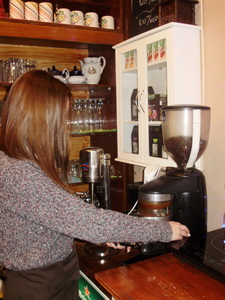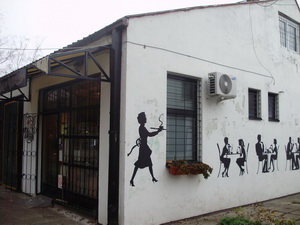 On a chilly winter afternoon, every now and then neighbours enter the doors of the modest, yet charming café “Dve šolje” (Two Cups) in the very heart of Novi Beograd’s Block 45. Two girl friends are going over last night’s night on the town, a mother with two kids, one still in a stroller, is here to get warm, and for the kids to have a cup of something hot. Two dads – colleagues from work – are also regulars for tea; their children are the same age, and through a smile they say: they use the weekend to see one another, and for the boys to play.
On a chilly winter afternoon, every now and then neighbours enter the doors of the modest, yet charming café “Dve šolje” (Two Cups) in the very heart of Novi Beograd’s Block 45. Two girl friends are going over last night’s night on the town, a mother with two kids, one still in a stroller, is here to get warm, and for the kids to have a cup of something hot. Two dads – colleagues from work – are also regulars for tea; their children are the same age, and through a smile they say: they use the weekend to see one another, and for the boys to play.
Although a mere few hundred yards away the locales of large shopping malls blaze away and the popular rafts sway tied to the banks of the Sava, the citizens of this, and the neighbouring blocks prefer to drop in at “Dve šolje”.
The café started working in August 2014, and is the first social enterprise started by the Centre for the Development of an Inclusive Society, a non-government organization with a long history of working on the development of inclusion and the improvement of the status of persons with disabilities. Themselves the bearers and partners of numerous projects for the (self)employment of persons with disabilities, they have decided – says Aleksandar Bogdanović, the founder and director of the Centre – to see in practice how a social enterprise operates in Serbia.
Five young people have found work at “Dve šolje”: three on a permanent basis, while two more are engaged during the summer season, in accordance with the amount of work. Miloš Marković, Dušan Pavlov and Aleksandra Đoković have persons with disabilities among their family members, and since the unemployment rate among youth in Serbia is high, a regular source of income means a lot to them.
 Although at first sight it may appear to be the work of an architect, a specialist in interior decoration, the inside is – as our interlocutor states – the result of resourcefulness. The greatest effort was invested in respecting the principles of accessibility. The entrance is wide enough for persons in wheelchairs, the service counter is also lower than the standard ones; they spent days looking for an adequate sink for the toilet, so that everything would be in accordance with inclusive design.
Although at first sight it may appear to be the work of an architect, a specialist in interior decoration, the inside is – as our interlocutor states – the result of resourcefulness. The greatest effort was invested in respecting the principles of accessibility. The entrance is wide enough for persons in wheelchairs, the service counter is also lower than the standard ones; they spent days looking for an adequate sink for the toilet, so that everything would be in accordance with inclusive design.
For the first year or two, as Bogdanović says, they expect to operate so as to stay “at zero”. They are proud to provide regular salaries for their employees, to regularly pay their supplier bills. They are happy that, through educating suppliers on social entrepreneurship and the status of persons with disabilities, they stimulated some of them to employ persons with disabilities, such as the Mlinprodukt Company, where they buy coffee.
Among their business successes, those not measured in money, but something far more important – social influence and recognition, they note “A Dinar for the Community”. During the first few months, they collected money, dinar by dinar in a jar, and used it to purchase toys for children from the Association for Assistance to Persons with Autism. With the arrival of the cold season, the activity was continued. The donated money is used to cook tea for children and homeless persons in this part of Novi Beograd.
 Government of the Republic of Serbia
Government of the Republic of Serbia















 pdf [271 KB]
pdf [271 KB]
Leave a Comment